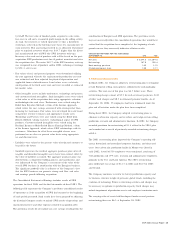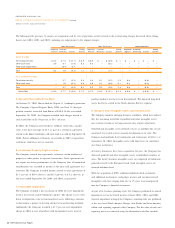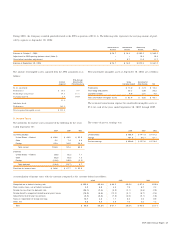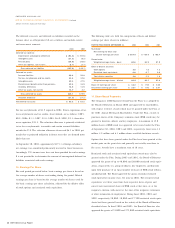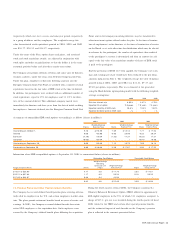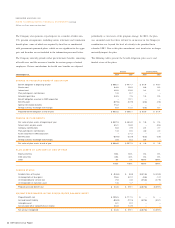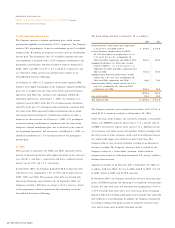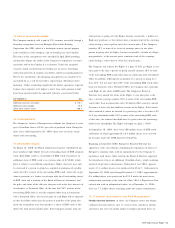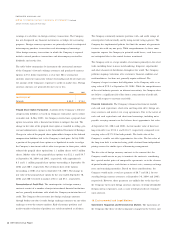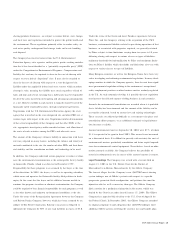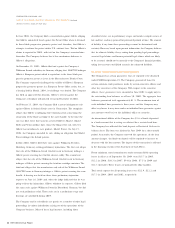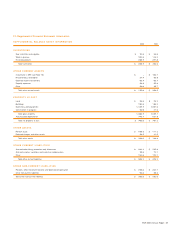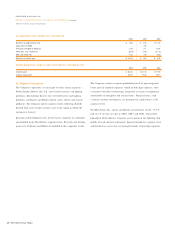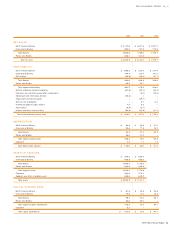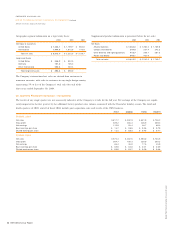Energizer 2004 Annual Report Download - page 41
Download and view the complete annual report
Please find page 41 of the 2004 Energizer annual report below. You can navigate through the pages in the report by either clicking on the pages listed below, or by using the keyword search tool below to find specific information within the annual report.
ENR 2004 Annual Report 39
shaving products businesses, are subject to various federal, state, foreign
and local laws and regulations intended to protect the public health and
the environment. These regulations primarily relate to worker safety, air
and water quality, underground fuel storage tanks and waste handling
and disposal.
The Company has received notices from the U.S. Environmental
Protection Agency, state agencies and/or private parties seeking contribu-
tion that it has been identified as a “potentially responsible party” (PRP)
under the Comprehensive Environmental Response, Compensation and
Liability Act, and may be required to share in the cost of cleanup with
respect to seven federal “Superfund” sites. It may also be required to
share in the cost of cleanup with respect to a state-designated site.
Liability under the applicable federal and state statutes which mandate
cleanup is strict, meaning that liability may attach regardless of lack of
fault, and joint and several, meaning that a liable party may be responsible
for all of the costs incurred in investigating and cleaning up contamination
at a site. However, liability in such matters is typically shared by all of the
financially viable responsible parties, through negotiated agreements.
Negotiations with the U.S. Environmental Protection Agency, the state
agency that is involved on the state-designated site and other PRPs are at
various stages with respect to the sites. Negotiations involve determinations
of the actual responsibility of the Company and the other PRPs at the
site, appropriate investigatory and/or remedial actions, and allocation of
the costs of such activities among the PRPs and other site users.
The amount of the Company’s ultimate liability in connection with those
sites may depend on many factors, including the volume and toxicity of
material contributed to the site, the number of other PRPs and their finan-
cial viability, and the remediation methods and technology to be used.
In addition, the Company undertook certain programs to reduce or elimi-
nate the environmental contamination at the rechargeable battery facility
in Gainesville, Florida, which was divested in November 1999.
Responsibility for those programs was assumed by the buyer at the time
of the divestiture. In 2001, the buyer, as well as its operating subsidiary
which owns and operates the Gainesville facility, filed petitions in bank-
ruptcy. In the event that the buyer and its affiliates become unable to
continue the programs to reduce or eliminate contamination, the Company
could be required to bear financial responsibility for such programs as well
as for other known and unknown environmental conditions at the site.
Under the terms of the Reorganization Agreement between the Company
and Ralston Purina Company, however, which has been assumed by an
affiliate of The Nestle Corporation, Ralston’s successor is obligated to
indemnify the Company for 50% of any such liabilities in excess of $3.0.
Under the terms of the Stock and Asset Purchase Agreement between
Pfizer, Inc. and the Company, relating to the acquisition of the SWS
business, environmental liabilities related to pre-closing operations of that
business, or associated with properties acquired, are generally retained
by Pfizer, subject to time limitations varying from two years to 10 years
following closing with respect to various classes or types of liabilities,
minimum thresholds for indemnification by Pfizer and maximum limita-
tions on Pfizer’s liability, which thresholds and limitations also vary with
respect to various classes or types of liabilities.
Many European countries, as well as the European Union, have been very
active in adopting and enforcing environmental regulations. In many devel-
oping countries in which the Company operates, there has not been signif-
icant governmental regulation relating to the environment, occupational
safety, employment practices or other business matters routinely regulated
in the U.S. As such economies develop, it is possible that new regulations
may increase the risk and expense of doing business in such countries.
Accruals for environmental remediation are recorded when it is probable
that a liability has been incurred and the amount of the liability can be
reasonably estimated, based on current law and existing technologies.
These accruals are adjusted periodically as assessments take place and
remediation efforts progress, or as additional technical or legal informa-
tion becomes available.
Accrued environmental costs at September 30, 2004 were $7.5, of which
$1.8 is expected to be spent in fiscal 2005. This accrual is not measured
on a discounted basis. It is difficult to quantify with certainty the cost of
environmental matters, particularly remediation and future capital expendi-
tures for environmental control equipment. Nevertheless, based on infor-
mation currently available, the Company believes the possibility of
material environmental costs in excess of the accrued amount is remote.
Legal Proceedings The Company was served with a lawsuit filed on
August 12, 2003 in the U.S. District Court for the District of
Massachusetts in Boston, Massachusetts by the Gillette Company.
The lawsuit alleges that the Company’s new QUATTRO men’s shaving
system infringes one of Gillette’s patents with respect to a specific
progressive geometric blade configuration, and petitions the court for
injunctive relief as well as monetary damages. The Gillette Company
filed a motion for a preliminary injunction in the matter, which was
denied by the Court in an order issued January 15, 2004. The Gillette
Company has appealed this decision to the U.S. Court of Appeals for
the Federal Circuit. In December 2003, the Gillette Company amended
its original complaint to add allegations that QUATTRO infringes three
additional Gillette patents involving the system’s tray and handle grips.


